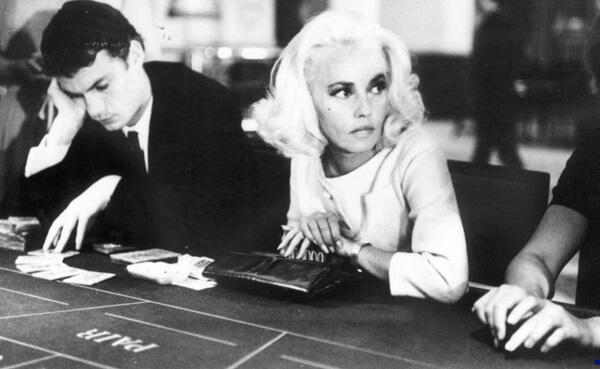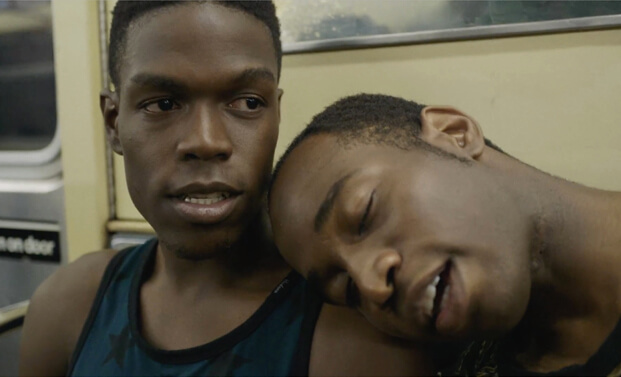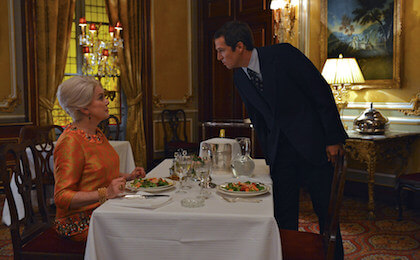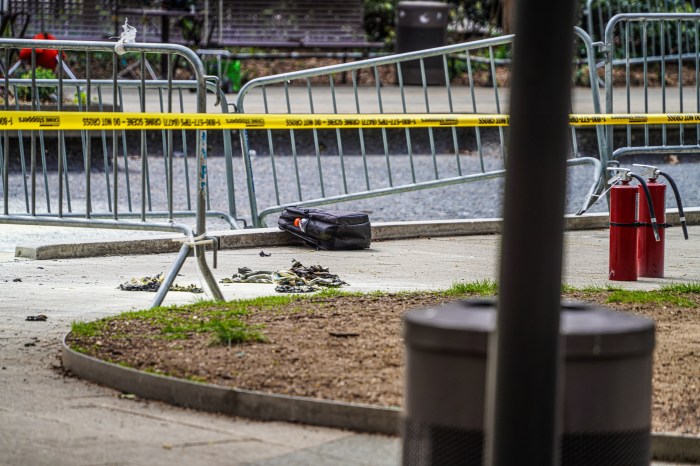Kacey Mottet Klein and Corentin Fila in André Téchiné’s “Being 17.” | STRAND RELEASING
Gay French filmmaker André Téchiné may be best known for his 1994 film “Wild Reeds” that depicted the coming-of-age of four teenagers — one of them queer — in southwest France in 1962. His new film, “Being 17,” is also a teenage coming-of-age film, this time set in the Pyrenees of today. Like the superb “Wild Reeds,” “Being 17” is a perceptive drama about youth grappling with same-sex desire and also learning to be flexible in their embrace of life.
Damien is a good student who lives with his mother, Marianne, the local doctor. His classmate Thomas lives on a farm in the nearby mountains with his adoptive parents, Christine and Jacques. As the film opens, a rivalry has developed between the boys in school. Thomas trips Damien in class one day, and the two get into a fight playing basketball in gym class. Thomas also pushes Damien into the snow one afternoon. The bullying concerns the principal, and what is behind it is initially unclear.
The boys are eventually forced to deal with their dislike for one another. Charmed by Thomas when she visits Christine one day, Marianne tells his mother she should go to the hospital for the weariness her pregnancy has brought on; she takes in Thomas to live with her and Damien to ease his three-hour round-trip commute to school. Living together, the boys begin to tolerate each another, though they also continue to fight — even as suppressed passions begin to well up.
André Téchiné once again scores with a coming-of-age story subtly told
Téchiné keeps his camera close up on the boys’ faces throughout the film, scrutinizing them and their emotions — when Damien is feeling anger and lust in equal measure and when Thomas stares back at Damien, practically daring him to blink first. Their tough exteriors mask an insecurity and desire that eventually brings the boys together, but along the way the sexual tension informs their experiences — from fighting with each other to an excursion Damien initiates online with a local gay man.
“Being 17” unfolds unhurriedly in three parts: the boys’ winter, spring, and summer trimesters. A metaphor of thawing parallels the boys opening up their hearts to each other. When Damien confesses to Thomas, “I don’t know if I’m into guys or just you,” it is a powerful moment, but Téchiné plays it very matter-of-factly. Though affecting, it’s not unduly portentous. The filmmaker uses the same light touch when Damien comes out to Marianne, admitting that Thomas hurt him because Damien tried to kiss him.
It takes a while before the two teens do steal kisses in secret, but when they get there it is satisfying because viewers have come to know each one and can appreciate their similarities as well as their differences. The film has a raw, gritty feel to it — with a snowy mountainous setting and scenes of farm life — but Téchiné infuses “Being 17” with a romantic sensibility, as well. The mood is especially tender when Damien ogles Thomas as he strips to go skinny-dipping in a cold mountain lake and when the two boys are lying naked together in bed the morning after sex.
The naturalistic style of the film is also reflected in the performances. Kacey Mottet Klein as Damien has a baby face and a sensitivity about him, but he also projects an intelligence and toughness that are equally endearing. In contrast, angel-faced Corentin Fila plays Thomas with a much harder, defensive nature. He resists Damien’s affections in front of his adoptive parents, suggesting he is still not completely comfortable with his sexuality, even as he is trying to reconcile his place in the family with Christine’s new baby on the way. Fila captures the pressures facing Thomas in heartbreaking fashion, his closed-in body language and blank expressions signaling deeper troubles that may explain why he is so quick to fight. As his character evolves, Fila makes Thomas’ change wholly credible.
In support, Sandrine Kiberlain is warm and engaging as Marianne, who undergoes her own dramatic arc in the third act, a subplot best not spoiled.
“Being 17” offers the hallmarks of Téchiné’s best work — a compassion for its characters, a leisurely, elliptical narrative, and keen insights into human behavior. The film does not rise to the high standard set by “Wild Reeds,” but it is worthwhile nonetheless.
BEING 17 | Directed by André Téchiné | Strand Releasing | Opens Oct. 7 | Lincoln Plaza Cinema | 1886 Broadway at 62nd St. | lincolnplazacinema.com | IFC Center, 323 Sixth Ave. at W. Third St. | ifccenter.com

































